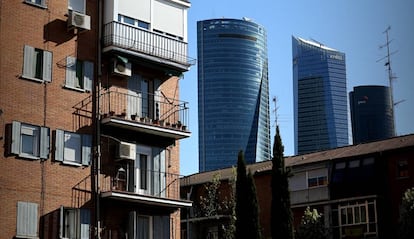Spain’s broken social elevator: How the crisis damaged upward mobility
It would take a Spaniard born into a low-income family four generations to reach the country’s average income, an OECD report finds

“In my younger and more vulnerable years my father gave me some advice that I’ve been turning over in my mind ever since. Whenever you feel like criticizing anyone, he told me, just remember that all the people in this world haven’t had the advantages that you’ve had.”
The opening line from The Great Gatsby, the masterpiece by F. Scott Fitzgerald, shows two things: that the world is unfair and that it is unequal. It was so in 1920s America, and it is so in contemporary Spain.
Being born into a more educated family with more financial possibilities is practically a guarantee of better job prospects
The social elevator – the economic and social mechanisms that allow the new generations to be better off than their parents and grandparents – is slow, and it keeps making long stops.
It would take a Spaniard born into a low-income family four generations (120 years) to reach the country’s average income. That’s the kind of time frame revealed by a new study by the Organization for Economic Cooperation and Development (OECD), “A Broken Social Elevator? How to Promote Social Mobility.”
While this period of time is shorter than the average for all OECD countries, there are signs that the situation has deteriorated in recent years. Being born into a more educated family with more financial possibilities is practically a guarantee of better job prospects.
“During the crisis, given similar training, people from a lower socioeconomic background suffered more. If your parents were manual workers, there is a 50% chance that you will be one as well,” says Luis Ayala, who teaches economics at King Juan Carlos University.

Millions of working-class Spaniards seem fated by birth to remain in precarious, ill-payed jobs with fewer social benefits. This system limits prosperity, economic growth and productivity, while talent gets lost along the way. In a low-mobility economy, not only are we paying too much money for the work of a privileged few, but we are also trying to prosper with low-skilled workers, warns David B. Grusky, director of the Stanford University Center on Poverty and Inequality.
The US philosopher John Rawls said that people with similar skills and abilities, and an identical desire to use them, should have equal prospects of success regardless of their initial status.
But this is not the case in Spain, where mobility within the same generation is like a stopped elevator. A worker could spend his or her entire professional life without moving up to the next rung. According to the OECD, 66% of Spaniards within the poorest 20% of the population will remain stuck there. The average in the richest countries is 57%. “The problem is not so much that the elevator is not working, but that income inequality has increased, which is even worse. Above all, it has consequences in investment in human capital,” warns Clàudia Canals, a senior economist at CaixaBank Research.
Growing inequality
Unfortunately, 21st-century capitalism cannot be explained without inequality, which grew throughout the 1990s, trapping millions of families in wealthy nations at the bottom of the income ladder.
Millions of working-class Spaniards seem fated by birth to remain in precarious, ill-payed jobs with fewer social benefits
“What’s worrying about high inequality levels is that it fragments society and creates polarization,” says Branko Milanović, an economist who teaches at the Maryland University School of Public Policy.
And there are indications that greater income inequality runs parallel to lower mobility, adds Brian Nolan, a professor of social policy at Oxford University. It is the Great Gatsby curve, a concept introduced by the economist Alan Krueger when he advising ex-US president Barack Obama. The curve shows a correlation between low social mobility and high inequality.
“In Spain, the reduction of inequality among the poorest layers of society has slowed down brutally. Now, unskilled workers have reduced working days and lower income, and this affects their children’s education,” says Gonzalo García, a markets expert at Analistas Financieros Internacionales (AFI). That loss in the early stage of life will define the children’s future. “The care and training that children get between the ages of zero and five play a determining role in whether they will find a good job and a good salary in the future,” he says.
The scenario is even starker if we consider that the horizon holds the beginnings of a new crisis and greater unemployment. “When both parents lose their jobs in a Scandinavian country, this has a very small impact on their children’s chances of going to university. But it’s the opposite in the US or in Spain,” says Markus Gangl, a sociology professor at Goethe University in Frankfurt. This is because northern European countries protect their citizens with a generous system of unemployment benefits, grants and low tuition fees. In Spain, 617,000 households have no income whatsoever and 2.6 million children are at risk of poverty.
“There are many repercussions to that immobility, and women are among the worst affected, but if I had to choose one effect, it would be talented people’s inability to prosper within the formal economy. Many of them end up in jobs beneath their potential or are forced to move abroad,” says Giles Alston, and expert at Oxford Analytica.
The OECD report talks about “sticky floors” and “sticky ceilings” to illustrate how the poorest members of society remain trapped at the bottom of the social ladder while the wealthy remain at the top for a long time. Over a four-year period, the poorest 20% have “few possibilities of climbing rungs,” and 66% will remain trapped at the bottom.
“The problem of lack of mobility is a very serious one,” notes Stefano Scarpetta, director of Employment, Labor and Social Affairs at the OECD. “It means, for instance, that many investment opportunities remain unexploited and potential businesses never see the light.”
No miracle solutions
There is no miracle solution to make the social elevator go faster. Economists propose reinforced support for the unemployed, raising productivity and improving the economic output. But entire generations of Spanish policymakers have been trying to make this work. Education should pull on the elevator, but there are elements weighing it down. Spain has the highest early school dropout rate in the European Union, 19.9% in 2015.
The rich getting richer
There are growing numbers of wealthy individuals in the world, and their bank accounts are more padded than ever before. In 2018, there were 42.2 million people with financial assets worth a million dollars or more, or 2.3 million more than in 2017, according to the latest global wealth report by Crédit Suisse. These fortunes combined represent €317 trillion, the equivalent of 300 times the GDP of Spain.
The US leads the ranking with 41% of all millionaires, whereas China is the country where this wealthy club is growing the fastest: 186,000 new millionaires last year. These figures are in stark contrast to the fact that 64% of the world’s adult population lives on less than $10,000.
But not even an education is enough to ensure upward mobility. “In my studies, I discovered that countries with more inequality such as Italy, the UK or Spain still have a salary gap among people with the same education level, which favors those who come from more privileged backgrounds,” says Michele Raitano, who teaches political economics at Sapienza University in Rome. “What counts is what the market rewards. If the market only values people’s productive skills, the best policy is to equate these skills, for instance by encouraging the education of talented youths from underprivileged backgrounds or mixing students from different social backgrounds.”
This reality contradicts the oft-repeated message that if one works hard and gets good training, good job prospects and a successful future will follow. The privilege of the elites remains strong. In Britain, a system of 2,600 private schools has produced 29% of all prime ministers and 74% of judges.
Spain has its own exclusive business schools. “They are drivers of inequality,” admits Gayle Allard, who teaches at the IE Business School. “It is an expensive education. We give out scholarships and loans, but it is still an elite education.”
“Sometimes, although there are no equal opportunities, if the economy grows very fast it is possible to compensate for it,” holds Jorge Rodríguez Menés, who teaches political and social science at Pompeu Fabra University.
If education is not enough and economic growth is not a guarantee of success, what can be done? “The best strategy to increase mobility is to reduce inequality in the families,” says Suresh Naidu, a professor of economics at Columbia University and one of the founders of the network Economics for Inclusive Prosperity.
Spaniards place little faith in the merit system: 53% of respondents in the OECD study believe that having a good education and parents with higher earnings are essential factors to doing well in life. This is far higher than the OECD average of 37%. This is maybe not so surprising in a country filled with revolving doors, families that got rich under Franco, and where family contacts are still the best professional network.
“It is true that family nepotism is still alive and well, but the job market is changing a lot. Children increasingly do not follow in their parents’ professional footsteps, because maybe those jobs no longer exist in the first place,” says Clàudia Canals, of CaixaBank Research.
“The nepotism and the lack of a merit-based system has a direct impact on productivity and potential growth, and it remains one of the pending challenges for Spanish businesses, universities and also politics,” says the economist José Carlos Diez.
English version by Susana Urra.
Tu suscripción se está usando en otro dispositivo
¿Quieres añadir otro usuario a tu suscripción?
Si continúas leyendo en este dispositivo, no se podrá leer en el otro.
FlechaTu suscripción se está usando en otro dispositivo y solo puedes acceder a EL PAÍS desde un dispositivo a la vez.
Si quieres compartir tu cuenta, cambia tu suscripción a la modalidad Premium, así podrás añadir otro usuario. Cada uno accederá con su propia cuenta de email, lo que os permitirá personalizar vuestra experiencia en EL PAÍS.
¿Tienes una suscripción de empresa? Accede aquí para contratar más cuentas.
En el caso de no saber quién está usando tu cuenta, te recomendamos cambiar tu contraseña aquí.
Si decides continuar compartiendo tu cuenta, este mensaje se mostrará en tu dispositivo y en el de la otra persona que está usando tu cuenta de forma indefinida, afectando a tu experiencia de lectura. Puedes consultar aquí los términos y condiciones de la suscripción digital.









































